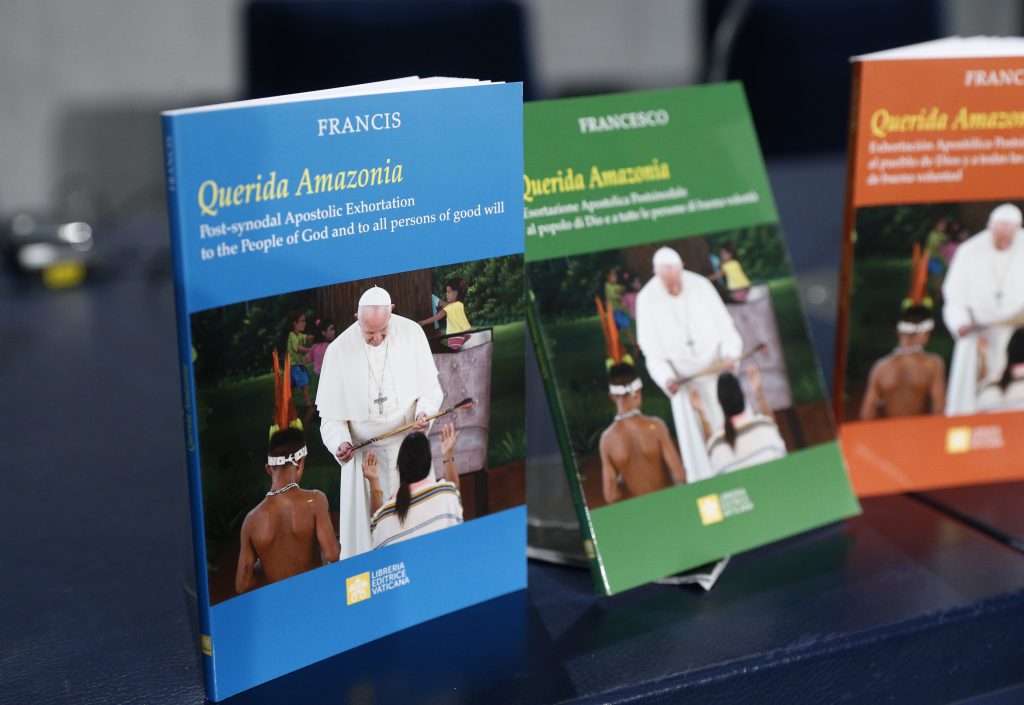ROME — When Pope Francis concluded an intensely controversial Synod of Bishops for the Pan-Amazon region last October with a Feb. 12 document completely ignoring those controversies, it was up for grabs how reaction might play out.
In theory, both advocates for contentious proposals such as married priests, women deacons, and an Amazonian rite of the Mass, as well as the foes of those ideas, could claim either victory (“he didn’t say no”) or defeat (“he didn’t say yes”).
As the dust begins to settle, it now seems clearer who’s inclined to assert what. In a word, the right seems tempted to declare a win, the left a setback.
On Feb. 13, the Rome office of the conservative Catholic group Tradition, Family and Property, which has been operating a “synod watch” website, put out an email touting a new post entitled “Pope Francis Ratifies Leonardo Boff but Tosses Fritz Löbinger in the Tiber.”
It was a play, of course, of the celebrated incident during the synod when statues of a female Amazonian fertility figure, which had been prominently displayed at various moments along the way and which were derided by critics as pagan idols, were stolen from a Roman church and tossed into the Tiber River, only to be later dredged up by police and returned.
Boff is a Brazilian theologian and ex-priest associated with the liberation theology movement in Latin America, while Bishop Löbinger is a German missionary who spent his career in South Africa and who authored a 2004 book in favor of the ordination of married men to the priesthood, albeit in some way different from celibates.
The suggestion of the piece is that while “Querida Amazonia” (Beloved Amazonia”), the pope’s apostolic exhortation offering his conclusions from the synod, largely endorses the social analysis of the liberation theology movement, confirming, as these critics would put it, “the priority of politics over religion” under Pope Francis, at least it doesn’t approve the ordination of the “viri probati,” or tested married men, which was the synod’s single most contested idea.
“For those who were involved in blocking the revolutionary agenda of the mentors of the Synod of Bishops for the Pan-Amazon region, there are motives for satisfaction,” the piece says of Francis’ document.
“What were the reasons that led Pope Francis to stop the much-propagandized opening to married priests? Was it to avoid a schism, or to take a step back in hopes of taking two forward in short order?”
“We’ll see,” the piece says, while leaving the clear impression that at least for now, the pope’s hand has been stayed by the force of the opposition the proposal faced inside and outside the October summit.
Another German bishop was more enthusiastic. Cardinal Gerhard Müller, who was replaced by Pope Francis as the Vatican’s top doctrinal official in 2017 and since has been one of the pope’s most outspoken conservative critics, praised “Querida Amazonia” as a “document of reconciliation.”
“The pope does not want to fuel existing political, ethnic and inner-Church conflicts and conflicts of interest, but rather to overcome them,” wrote Cardinal Müller in a blog post for the National Catholic Register.
“It is to be hoped that the interpreters of this document will refrain from unnecessary harshness and take up the concerns of the Holy Father like true sons and daughters of the Church in a spirit of agreement and collaboration.”
Meanwhile, the Catholic Women’s Council, a progressive group and part of a network that also includes Voices of Faith, released its own statement on “Querida Amazonia,” lamenting that it represents “a further withdrawal from any concrete or bold proposals for reform and to bring about solutions to the pressing issues the Amazonia region are facing.”
Specifically, the statement takes aim at passages in the pope’s document warning against “clericalizing” women, for instance by opening the diaconate to them.
“Surely, if clericalism is a dysfunctional aspect of the contemporary priesthood and inculturation offers a new and more diverse understanding of what it means to be a priest, then the ordination of women with all the qualities that Pope Francis attributes to them would be the best possible antidote to the clerical mindset?” the statement said.
“The pope recommended reading the final document of the synod but did not settle the questions and open pastoral suggestions contained therein,” the women’s group said. “ ‘Querida Amazonia’ proposed no concrete answers or solutions to those questions and requests.”
The tone of the statement clearly suggested disappointment, and it was tantamount to saying that the pope failed to deliver what we, and the people we represent, wanted out of the synod.
What explains the apparent difference in tone between right-wing and left-wing activists?
Perhaps it’s as simple as the fact that by now, traditionalist dissidents have such low expectations of the Pope Francis papacy that anything short of what they would see as utter calamity strikes them as good news. Progressives, on the other hand, have been running the table on a number of issues, and perhaps are more inclined to see anything less than complete victory as a surprise.
Perhaps, too, both sides are operating on the assumption that if a pope is faced with a question and doesn’t say yes, by default it’s a way of saying no.
In reality, however, Pope Francis perpetually is a pope of surprise, and it’s probably hazardous to assume that simply because he didn’t engage the hot-button items in this document that he never will.
Maybe what all sides in the debate ought to be considering right now is the possibility that Pope Francis has neither closed a door nor opened one. Instead, he’s left the door in the condition in which he found it at the end of the synod, while he ponders whether, and when and how, he’ll ever be ready to walk through it.

